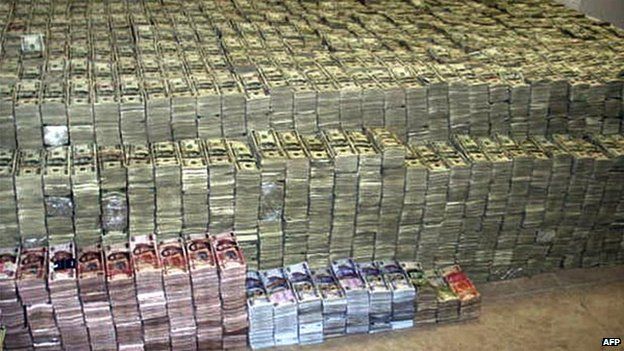'Smell of dollars' could catch smugglers
- Published

Criminals are smuggling billions in US bank notes into Mexico every year, but help could be on the way for border guards.
A machine that can "smell" dollars - like a sniffer dog senses narcotics - is being developed.
For the first time, chemists have captured the unique fragrance of US paper money.
They announced their discovery at the American Chemical Society meeting.
"Money sniffing is an unknown art. No-one had ever tried to find these aromas," said Dr Joseph Stetter, of KWJ Engineering.
"We found that US currency emits a wide range of volatile organic compounds that make a 'fingerprint' we can identify in less than a minute."
Daunting challenge
His firm is developing a handheld cash detector for border police, called the Bulk Currency Detection System (BCDS).
In the past fiscal year, US officials seized more than $106m in smuggled cash heading to Mexico - the bulk of it laundered drug money.
But that's only a whisker of the estimated $39bn that crosses the border undetected every year - hidden in clothing, baggage and vehicles.
Current checks are done by guards with dogs - but training is expensive and time-consuming.
Airport-style X-ray scanners have had some success detecting currency - but they are large and impractical for busy border checkpoints.
To find a swifter solution, the US Department of Homeland Security made a public challenge to scientists to develop "a device that will search for and identify bulk quantities of currency - secreted on persons, in hand baggage and luggage, and/or in privately owned vehicles."
This money-sniffing machine must pass three intimidating challenges.
First - it must be precise enough to pick up the whiff of dollar bills amid a cacophony of background aromas.
"It has to work even in the presence of car exhaust, perfumes, food, and at a range of temperatures and humidity," said Dr Suiqiong Li, a researcher at KWJ.
"You need a smart algorithm to sort the needle from the haystack."
Next - it has to deliver a reading within seconds at hectic border crossings. There is no time to send samples off to a lab.
And finally, the probe has to be portable - light enough for a guard walking up and down a line of people, and flexible enough to reach inside vehicles or shipping containers.
KWJ has already developed sensors for carbon monoxide detectors and alcohol breathalysers - as modelled by their company mascot panda "Sensor Bear".
Sniffer backpack
To capture the fragrance of money, they collected one hundred used $1 bills in various states - from crumpled and smelly to crisp and shiny.
They sealed the notes in a chamber and warmed them to release vapours at two temperatures: 24C and 40C.
"We saw tremendous variability and contamination - every one of the notes was different," said Dr Stetter.
But a signature common to all of the bills was eventually teased out.
It turns out this odour comes from a set of trace chemicals, including aldehydes, furans and organic acids.
"The amounts are tiny - at best a small fraction of a ppm [part per million]. This presents a formidable analytical challenge," the researchers say.
So does the "smell of dollars" come from the ink? Or the bank note itself? The precise source is not likely to be revealed in a published scientific journal - for security reasons, the researchers say.
But having found the perfume, they now face another daunting technical challenge - building a practical device for border police.
Their design is a backpack with a handheld probe. The pack will house a miniature GC-MS (gas chromatograph-mass spectrometer) of the type already used to detect drugs and explosives.
Ultimately, this could be superseded by an "electronic nose" - a sophisticated sensor array.
To sniff for hidden currency, border guards would pass the probe over clothing or into baggage.
A high-intensity reading would indicate that a large stash of money is concealed.
"You smell like a million dollars" may not be a compliment for much longer.
- Published19 June 2012
- Published16 June 2010
- Published30 July 2013
- Published30 June 2014